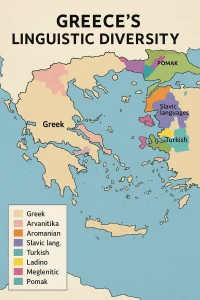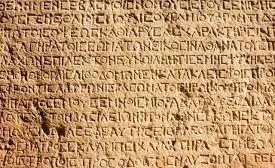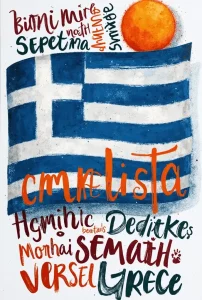Greece, the cradle of myth, philosophy, and ancient civilizations, is a linguistic oasis brimming with Greek languages having historical roots that span millennia. While modern Greek dominates daily life, the country’s linguistic tapestry includes regional dialects, minority languages, and immigrant tongues—each reflecting Greece’s layered history of conquest, trade, and globalization.
The official language is Greek.
Nearly everyone in Greece – about 99.5% of the population – uses modern Greek in their daily lives. It’s not just an official language on paper; it’s the real, working language for business, government, and education.
And, well, there’s a reason for that. The breathtaking developments of modern Greece can be traced back more than 3400 years. It possesses a unique alphabet consisting of 24 letters and an equally rich vocab, meaning that it can be used in a wide range of fields from law to marketing. Moreover, it is not only Greece that has Greek as an official language. Cyprus does too which means that it is used in governance, everyday life, and day-to-day activities. Therefore, if you are considering conducting business in this area, learning Greek is a crucial step, not merely a recommendation.
Greek dialects spoken in different regions
While Greek remains largely unified on a national level, regional dialects continue to demonstrate the country’s complex linguistic landscape.
Take Cretan Greeks, for example – they’re a lively bunch residing in Crete where the Greek language is uniquely peppered with local differences, especially during casual conversation. Now consider Tsakonian, a dialect that has a direct line of descent to ancient Doric Greek, which is currently in the fight of its life with only a few hundred speakers in the Peloponnese, making it linguistically priceless.
Once widely spoken around the Black Sea, Pontic Greek is still spoken by roughly half a million people in Greece today. In stark contrast, Cappadocian Greek is enduring tough times due to the loss of native speakers resulting from many shifting to Standard Greek.
Reflecting the historical autonomy of the Mani region, Maniot Greek serves as a marker of local identity and regional pride. Yevanic, or Judeo-Greek, once spoken by the Romaniote Jewish community, is now close to completely vanishing.
Regardless, these dialects are significant to the culture of Greece because they showcase the country’s diverse regional and historical identity.
Greek Minority Language
In addition, there exist several minority languages in Greece, most of which are immigrant and ethnic community languages:
- Albanian – The largest minority language, spoken by over 443,000 Albanian immigrants.
- Turkish- Approximately 128,000 people, mostly in Western Thrace, speak their ancestral language.
- Romani: Some 160,000 speakers of the Roma language are scattered all over the country.
- Other post-Soviet and Balkan languages are spoken by smaller populations.
- Romanian (Vlach): Some 40,000 persons speak this Romance language, related to Romanian.
- Bulgarian and Pomak, in particular in Western Thrace and North Greece.
- Armenian – Approximately 20,000 people, primarily within the Armenian diaspora, continue to use this language.
- Macedonian Slavic Dialect – This dialect is spoken by a segment of the northern population. Its official status, however, is still subject to ongoing debate.
- Ladino (Judeo-Spanish) – Now endangered, Ladino is used mainly by elderly members of the Sephardic Jewish community.

Collectively, these languages reflect Greece’s diverse cultural heritage and its longstanding position as a bridge between Eastern and Western influences.
Greek Foreign Languages
Due to tourism and globalisation, foreign languages are now frequently spoken in Greece:
With 48% of the people speaking it, English is the most widely spoken foreign language. It is utilized in commerce and tourism and is taught from a young age.
- German: Due to close commercial and tourism ties, 9% of people speak this language.
- French: a common second foreign language in schools, spoken by 8.5% of students.
- Italian: Due to historical Italian influence, 8% of people speak this language, particularly on the Ionian Islands.
- Russian: becoming more and more prevalent, particularly among business populations and recent immigrants.
- Our Greek interpreters and translators at TransLinguist are knowledgeable in the linguistic and cultural quirks of these foreign languages as they relate to Greek culture.
Our Greek interpreters and translators at TransLinguist are knowledgeable in the linguistic and cultural quirks of these foreign languages as they relate to Greek culture.
Why You Should Know about Greece’s Linguistic Diversity
Knowing the linguistic diversity of Greece may help make your communication strategy more effective if you are a multinational corporation seeking high-end Greek translation and interpretation services or a firm entering the Greek market. This shall ensure linguistic accuracy and cultural sensitivity at all stages – from translating marketing materials into Modern Greek to providing interpretation in regional dialects or minority languages.
Make TransLinguist Your Greek Language Partner
Support for minority and foreign languages spoken in Greece
✅ Certified interpretation services for legal, medical, and business settings
✅ Localization services catered to Greek culture and regional preferences
✅ Translation from Greek to English and English to Greek is provided by TransLinguist, a network of professional linguists, native speakers, and industry experts.
📞 Are You Prepared to Engage Audiences Who Speak Greek?
To advance your multilingual communication in Greece, get in touch with TransLinguist right now.
FAQs
What languages are rooted in Greek?
Ancient varieties of the Greek language are the direct ancestors of several contemporary Greek dialects. Amongst them is the Tsakonian descended from ancient Doric Greek. Both Cappadocian and Pontic Greek have deep historical roots to the Byzantine and Hellenistic periods. Thus Greek is not the mother of a wholly new language but has enormously contributed lexical Greco-Latin in the form of scientific, philosophical, or theological terms to other European tongues.
What language did Ancient Greek originate from?
Proto-Greek was the final common ancestor of all attested Greek dialects. It is the stage expected to represent the ancient Greek language after Proto-Indo-European has produced all its descendants down to the Proto-Greek stage. Proto-Greek is held to date from the end of the Bronze Age, around 2000-1600 BCE.
What is history derived from Greek?
The words 'history' are derived from the Ancient Greek word 'historia' (ἱστoρία), which means 'any inquiry' or 'knowledge on account of investigation'.
Greek civilization created the foundations of such studies as a science with scholars like Herodotus and Thucydides. There are many modern academic and philosophical ideas with roots in Greece.
What are the roots of Greek culture?
The foundation of Greek culture is: the ancient myths, philosophy, and art of Greece
A lengthy literary and oral tradition, including Homer and other poets. Greek Orthodox Christianity and the Greek language survived in the Byzantine world. With the help of such extra ingredients today that come from migration, trade and globalization into Europe, the link now stretches between East and West.
What languages are descended from Greek?
These dialects include: Greek Standard Modern. The sole direct descendent of Doric Greek is Tsakonian, in addition to preserving aspects of Koine and Medieval Greek, Pontic, Cappadocian, and Maniot Greek contributed hundreds of root words and phrases to Romance, Germanic, and Slavic languages, particularly in the domains of academia, medicine, and science. Greek itself internally diversified into several dialects but failed to produce entirely new languages as Latin did with the Romance languages.





